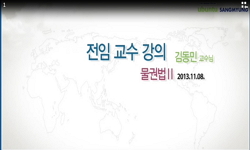The Mareva injunction (also known as the freezing order, Mareva order, or the Mareva regime), in Commonwealth jurisdictions, is a court order which freezes assets so that a defendant of an action cannot dissipate his or her assets from beyond the juri...
http://chineseinput.net/에서 pinyin(병음)방식으로 중국어를 변환할 수 있습니다.
변환된 중국어를 복사하여 사용하시면 됩니다.
- 中文 을 입력하시려면 zhongwen을 입력하시고 space를누르시면됩니다.
- 北京 을 입력하시려면 beijing을 입력하시고 space를 누르시면 됩니다.

재산명시제도의 실효성 확보방안: 영국의 재산동결명령과 재산개시명령을 중심으로 = The Arguments on the Effectiveness of Securing Plan of Asset Disclosure System focusing on the Asset Freezing Injunctions and Disclosure Orders in the United Kingdom
한글로보기부가정보
다국어 초록 (Multilingual Abstract)
It is not a security, nor a means to pressure a judgment debtor, nor does it confer a proprietary interest in the assets of the judgment debtor. However, some authorities have treated the Mareva injunction as an order to stop a judgment debtor from dissipating his assets so as to have the effect of frustrating judgment, rather than the more strenuous test of requiring an intent to abuse court procedure. An example of the former would be paying off a legitimate debt, whereas an example of the latter would be hiding the assets in overseas banks on receiving notice of the action.
It is recognized as being quite harsh on defendants because the order is often granted at the pre-trial stage in ex-parte hearings, based on the affidavit alone. A Mareva injunction is often combined with an Anton Piller order in these circumstances. This process can be disastrous for a defendant as the cumulative effect of these orders can lead to destroying the whole of a business’ custom by freezing most of its assets and revealing important information to its competitors.
I introduce the asset freezing injunctions and disclosure orders in the United Kingdom. A freezing order will usually only be made where the claimant can show that there was at least a good arguable case that he or she would succeed at trial and that the refusal of an injunction would involve a real risk that a judgment or award in his or her favor would remain unsatisfied. Similar provisions are now required to be available in the rest of Europe, under Article 9(2) of the European Union Directive on the enforcement of intellectual property rights, approved in April 2004. This article may bring the big arguments into Korean academic society as well as the judicial and legislative branches. The effectiveness of asset disclosure system securing plan in Korea may also be expected because it is a totally different system, but it may make up for the weak points of the Korean system if we closely examine it. I also look forward to a more critical research publishing in near future based upon my contribution.
The Mareva injunction (also known as the freezing order, Mareva order, or the Mareva regime), in Commonwealth jurisdictions, is a court order which freezes assets so that a defendant of an action cannot dissipate his or her assets from beyond the jurisdiction of a court so as to frustrate a judgment. It was named after Mareva Compania Naviera SA v. International Bulkcarriers SA [1975] 2 Lloyd’s Rep. 509, decided in 1975, although the first recorded instance of such an order in English jurisprudence was Nippon Yusen Kaisha v. Karageorgis in 1975, decided very shortly before the Mareva decision; however, in the United Kingdom, the Civil Procedure Rules 1998 now define the Mareva order as a “freezing” order. It is widely recognized in other common law jurisdictions, and such orders can be made to have a world-wide effect. It is variously construed as part of a court’s inherent jurisdiction to restrain breaches of its process.
It is not a security, nor a means to pressure a judgment debtor, nor does it confer a proprietary interest in the assets of the judgment debtor. However, some authorities have treated the Mareva injunction as an order to stop a judgment debtor from dissipating his assets so as to have the effect of frustrating judgment, rather than the more strenuous test of requiring an intent to abuse court procedure. An example of the former would be paying off a legitimate debt, whereas an example of the latter would be hiding the assets in overseas banks on receiving notice of the action.
It is recognized as being quite harsh on defendants because the order is often granted at the pre-trial stage in ex-parte hearings, based on the affidavit alone. A Mareva injunction is often combined with an Anton Piller order in these circumstances. This process can be disastrous for a defendant as the cumulative effect of these orders can lead to destroying the whole of a business’ custom by freezing most of its assets and revealing important information to its competitors.
I introduce the asset freezing injunctions and disclosure orders in the United Kingdom. A freezing order will usually only be made where the claimant can show that there was at least a good arguable case that he or she would succeed at trial and that the refusal of an injunction would involve a real risk that a judgment or award in his or her favor would remain unsatisfied. Similar provisions are now required to be available in the rest of Europe, under Article 9(2) of the European Union Directive on the enforcement of intellectual property rights, approved in April 2004. This article may bring the big arguments into Korean academic society as well as the judicial and legislative branches. The effectiveness of asset disclosure system securing plan in Korea may also be expected because it is a totally different system, but it may make up for the weak points of the Korean system if we closely examine it. I also look forward to a more critical research publishing in near future based upon my contribution.
국문 초록 (Abstract)
본고에서는 이러한 재산동결명령 및 재산개시명령을 중심으로 영국의 재산명시제도를 설명하였다. 이 제도는 거액의 국제적 사기 사건과 같은 위법성이 대단히 높은 사건에 대하여는 진가를 발휘해 피해자에게 강력한 구제책을 제공할 수 있다. 환율규제가 완화되어 즉시 국가간 송금수단이 확보되어 있는 금융시장이 발달한 오늘날 어느 나라도 국제적인 재산의 은닉ㆍ산일 사례와 연관이 없는 나라는 없다고 해도 과언은 아니다. 이러한 때에 재산동결ㆍ개시명령은 아주 효과적인 집행확보 수단이 된다. 우리나라에서도 이제 조직적 사기사건, 부당권유 사건, 특별배임 사건 등이 빈발하고 있고 악질적인 채무자가 국제적으로 재산을 은닉ㆍ산일하는 사례가 끊이지 않고 있으며, 피해자가 민사소송에서 승소판결을 얻어도 채권회수가 불가능한 경우가 많다. 이런 경우에도 재산동결ㆍ개시명령은 좋은 구제수단으로 작용할 수 있다.
재산동결ㆍ개시명령은 여러 가지 특징이 있다. 우리나라의 가압류 명령과는 대조적으로 영국의 재산동결명령은 우선은 피신청인의 재산일반에 넓게 그물을 친후 신청인(피신청인)의 취소ㆍ변경에 의해서 개시되는 정보에 의해 그때그때의 사정에 맞추어 범위와 내용이 조정되어 간다. 재산동결명령에 부수하는 재산개시명령은 책임재산의 개시를 명하는 것이고 증거개시와 다른 절차이지만 책임재산의 개시에 의해서 결과적으로 형사소송에서 이용 가능한 증거가 개시될 가능성도 있다. 재산개시는 선서진술서(affidavit)에 의해서 명시되어야 하지만, 피신청인이 진실하지 않은 것을 알면서 또는 진실하다고 믿지 않으면서 개시를 하면 위증죄가 성립한다.
재산개시명령의 위반에 대해서는 본안심리에 있어서의 방어권박탈(debarment)의 제재와 법정모욕죄가 부과될 가능성도 있고 피신청인에 대하여 심문절차에 출석할 것을 명할 수 있다. 영국법원은 채무자가 수익자가 되고 있는 재산을 채무자와 밀접한 관계에서는 제3자(채무자의 지배회사나 배우자 등)가 점유 또는 지배하고 있다고 신뢰할 근거가 있을 경우에는 그러한 사람을 피신청인으로 하는 재산동결ㆍ개시명령을 발할 수 있다. 피신청인의 변호사도 의뢰인(피신청인)의 재산상황에 대해 개시의무를 지게 할 가능성이 있지만 변호사ㆍ의뢰인 사이의 특권이 있어 개시에 일정한 장해가 된다.
본고는 이상과 같은 특징을 가진 영국의 재산동결ㆍ개시명령에 대하여 상세한 논의를 하였으므로 우리나라 재산명시제도의 실효성 확보를 위한 비교법적 정보를 얻는데 크게 기여할 것으로 본다.
영국의 재산동결명령은 신청인에게 우선변제권을 주지 않는 단지 금전채권의 보전명령이다. 우리나라의 가압류명령과 같은 제도상의 목적을 가지고 있다. 그러나 압류명령과는 법적 성격...
영국의 재산동결명령은 신청인에게 우선변제권을 주지 않는 단지 금전채권의 보전명령이다. 우리나라의 가압류명령과 같은 제도상의 목적을 가지고 있다. 그러나 압류명령과는 법적 성격이 달라 피신청인의 재산을 압류할 수는 없고, 피신청인에 대하여 대인적으로 작용하는 것이기 때문에 대인명령(order in personam)으로 불린다. 재산동결ㆍ개시명령은 밀행성의 요청 때문에 통상은 소제기 전에 신청되어 비대심절차(ex-parte hearing)로 발령된다.
본고에서는 이러한 재산동결명령 및 재산개시명령을 중심으로 영국의 재산명시제도를 설명하였다. 이 제도는 거액의 국제적 사기 사건과 같은 위법성이 대단히 높은 사건에 대하여는 진가를 발휘해 피해자에게 강력한 구제책을 제공할 수 있다. 환율규제가 완화되어 즉시 국가간 송금수단이 확보되어 있는 금융시장이 발달한 오늘날 어느 나라도 국제적인 재산의 은닉ㆍ산일 사례와 연관이 없는 나라는 없다고 해도 과언은 아니다. 이러한 때에 재산동결ㆍ개시명령은 아주 효과적인 집행확보 수단이 된다. 우리나라에서도 이제 조직적 사기사건, 부당권유 사건, 특별배임 사건 등이 빈발하고 있고 악질적인 채무자가 국제적으로 재산을 은닉ㆍ산일하는 사례가 끊이지 않고 있으며, 피해자가 민사소송에서 승소판결을 얻어도 채권회수가 불가능한 경우가 많다. 이런 경우에도 재산동결ㆍ개시명령은 좋은 구제수단으로 작용할 수 있다.
재산동결ㆍ개시명령은 여러 가지 특징이 있다. 우리나라의 가압류 명령과는 대조적으로 영국의 재산동결명령은 우선은 피신청인의 재산일반에 넓게 그물을 친후 신청인(피신청인)의 취소ㆍ변경에 의해서 개시되는 정보에 의해 그때그때의 사정에 맞추어 범위와 내용이 조정되어 간다. 재산동결명령에 부수하는 재산개시명령은 책임재산의 개시를 명하는 것이고 증거개시와 다른 절차이지만 책임재산의 개시에 의해서 결과적으로 형사소송에서 이용 가능한 증거가 개시될 가능성도 있다. 재산개시는 선서진술서(affidavit)에 의해서 명시되어야 하지만, 피신청인이 진실하지 않은 것을 알면서 또는 진실하다고 믿지 않으면서 개시를 하면 위증죄가 성립한다.
재산개시명령의 위반에 대해서는 본안심리에 있어서의 방어권박탈(debarment)의 제재와 법정모욕죄가 부과될 가능성도 있고 피신청인에 대하여 심문절차에 출석할 것을 명할 수 있다. 영국법원은 채무자가 수익자가 되고 있는 재산을 채무자와 밀접한 관계에서는 제3자(채무자의 지배회사나 배우자 등)가 점유 또는 지배하고 있다고 신뢰할 근거가 있을 경우에는 그러한 사람을 피신청인으로 하는 재산동결ㆍ개시명령을 발할 수 있다. 피신청인의 변호사도 의뢰인(피신청인)의 재산상황에 대해 개시의무를 지게 할 가능성이 있지만 변호사ㆍ의뢰인 사이의 특권이 있어 개시에 일정한 장해가 된다.
본고는 이상과 같은 특징을 가진 영국의 재산동결ㆍ개시명령에 대하여 상세한 논의를 하였으므로 우리나라 재산명시제도의 실효성 확보를 위한 비교법적 정보를 얻는데 크게 기여할 것으로 본다.
참고문헌 (Reference)
1 김상수, "재산명시제도의 개정과 앞으로의 전망" 1 (1): 2004
2 김종백, "재산명시제도와 채무부이행자명부, 민사집행에 관한 제문제(상)" 71 : 1996
3 김성완, "재산명시제도에 관한 고찰" (425) : 2002
4 이원재, "재산명시제도, 채무불이행자 명부제도" 중앙경제사 (86) : 1998
5 이근영, "재산명시절차/민사집행소송" 한국사법행정학회 (2) : 2008
6 양병회, "재산명시절차 및 채무불이행자 명부제도의 개선" 48 (48): 1999
7 홍승식, "재산명시절차 등의 실효성"
8 임채웅, "재산명시절차 등에 관한 연구" 49 (49): 2000
9 임채웅, "재산명시절차 등에 관한 연구" 49 (49): 2000
10 이재목, "재산명시신청과 소멸시효 중단효" (1) : 2006
1 김상수, "재산명시제도의 개정과 앞으로의 전망" 1 (1): 2004
2 김종백, "재산명시제도와 채무부이행자명부, 민사집행에 관한 제문제(상)" 71 : 1996
3 김성완, "재산명시제도에 관한 고찰" (425) : 2002
4 이원재, "재산명시제도, 채무불이행자 명부제도" 중앙경제사 (86) : 1998
5 이근영, "재산명시절차/민사집행소송" 한국사법행정학회 (2) : 2008
6 양병회, "재산명시절차 및 채무불이행자 명부제도의 개선" 48 (48): 1999
7 홍승식, "재산명시절차 등의 실효성"
8 임채웅, "재산명시절차 등에 관한 연구" 49 (49): 2000
9 임채웅, "재산명시절차 등에 관한 연구" 49 (49): 2000
10 이재목, "재산명시신청과 소멸시효 중단효" (1) : 2006
11 진성규, "재산명시 절차 및 채무부이행자 명부" 21 : 1990
12 강대성, "민사집행법안의 재산명시제도에 관한 검토" 4 : 2001
13 이명우, "독일민사소송법상의 재산명시보증제도 및 채무자명부제도에 관한 고찰" 건국대학교 출판부 2 : 1991
14 심중선, "독일민사소송법상의 재산명시보증제도 및 채무자 명부제도에 관한 고찰" 순천대학교 사회과학연구소 3 : 1990
15 권오곤, "강제집행의 실효성 확보방안 우리의 재산명시제도와 미국의 집행보조절차의 비교를 중심으로" 17 : 1995
16 花村良一, "米国民事事件における裁判所侮辱の実情(4)" (714) :
17 花村良一, "米国民事事件における裁判所侮辱の実情(3)" (713) :
18 花村良一, "米国民事事件における裁判所侮辱の実情(2)" (712) :
19 三木浩一, "渉外的民事保全手段の新たな可能性-英国判例法が創設したワールドワイドㆍマリーバ․インジャンクションの評価と検討を通して-" 65 (65): 1992
20 東京地裁保全研究会, "民事保全の実務(上)" 2005
21 小梁吉章, "ワールドワイド․マリーバ․インジャンクションの承認․執行" 1 : 2005
22 Takahashi, Koji, "diction to Grant an Interim Freezing Order: Anglo-Japanese Comparison" 48 : 431-, 1999
23 Zuckerman, Adrian, "Zuckerman on Civil Procedure: Principles of Practice, 14th ed" 2006
24 Collins, Lawrence, "United States Supreme Court Rejects Mareva Jurisdiction" 115 : 601-, 1999
25 Kennet, Wendy, "The enforcement of judgments in Europe"
26 Jensen, Darryn, "The Rights and Wrongs of Discretionary Remedialism" 178-, 2003
27 Capper, David, "The Need for Mareva Injunctions Reconsidered" 73 : 2161-, 2005
28 Connal, Sulina, "The Mareva Injunction: a Cruel Tyranny?" 19 (19): 479-, 1997
29 McLachlan, Campbell, "The Jurisdictional Limits of Disclosure Orders in Transnational Fraud Litigation" 47 : 3-, 1998
30 Dockray, Martin, "The Inherent Jurisdiction to Regulate Civil Proceedings" 113 : 120-, 1997
31 Hess, Burkhard, "Study No. JAI/A3/2002/02 on making more efficient the enforcement of judicial decisions within the European Union: Transparency of a Debtor’s Assets, Attachment of Bank Accounts, Provisional Enforcement and Protective Measures’"
32 "Sixteenth Report of the Law Reform Committee" 3472-, 1967
33 Mitchell, Gregory, "Mareva injunctions and domestic assets" 3 (3): 210-, 1988
34 Ikeda, Yoshifumi, "Mareva Injunction and Japanese Provisional Remedy" Univ. of British Columbia 1998
35 Cuniberti, Gilles, "Les mesures conservatoires portant sur des biens situés à l’étranger"
36 Rozenberg, Joshua, "Lawyers Rush to Freeze Assets as Recession Turns Nasty’"
37 Ministry of Justice, "Judicial and Court Statistics 2011"
38 Zuckerman, Adrian, "Interlocutory Remedies in Quest of Procedural Fairness" 56 : 325-, 1993
39 Sheridan, L. A., "Injunctions in General"
40 Hoyle, Mark, "Freezing and Search Orders, 4th ed." 2006
41 Devonshire, Peter, "Freezing Orders, Disappearing Assets and the Problem of Enjoining Non-Parties" 118 : 124-, 2002
42 Maitland, Frederic William, "Equity, also the forms of action at common law; two courses of lectures"
43 Andrews, Neil, "English Civil Procedure" 2003
44 Gee, Steven, "Commercial Injunctions, 5th ed" 2004
45 Hollander, "Charles and Style, Christopher, Documentary Evidence, 9th ed" 2006
46 Hoffmann, Leonard, "Changing Perspectives on Civil Litigation’" 56 : 297-, 1993
47 Reece-Thomas, Katherine, "Anton Piller Orders : The New Statutory Scheme’" 17 : 272-, 1998
48 Andrews, Neil, "Accelerated Justice: Protective, Interimand Summary Procedures in English Law, In Current Topics of International Litigation" Current Topics of International Litigation 2009
49 Sime, Stuart, "A Practical Approach to Civil Procedure, 14th ed." 2011
동일학술지(권/호) 다른 논문
-
- 경희대학교 법학연구소
- 金成华
- 2012
- KCI등재
-
한-중 자유무역협정(FTA)상의 분쟁해결절차규칙에 대한 법정책적 제언
- 경희대학교 법학연구소
- 최승환
- 2012
- KCI등재
-
- 경희대학교 법학연구소
- 강희원
- 2012
- KCI등재
-
국가관할권 이원지역(ABNJ)에서의 국제해양법질서와 향후 과제: 해양유전자원에 관한 국제레짐 논의를 중심으로
- 경희대학교 법학연구소
- 박수진
- 2012
- KCI등재
분석정보
인용정보 인용지수 설명보기
학술지 이력
| 연월일 | 이력구분 | 이력상세 | 등재구분 |
|---|---|---|---|
| 2022 | 평가예정 | 재인증평가 신청대상 (재인증) | |
| 2019-01-01 | 평가 | 등재학술지 유지 (계속평가) |  |
| 2016-01-01 | 평가 | 등재학술지 유지 (계속평가) |  |
| 2012-01-01 | 평가 | 등재 1차 FAIL (등재유지) |  |
| 2009-01-01 | 평가 | 등재학술지 선정 (등재후보2차) |  |
| 2008-01-01 | 평가 | 등재후보 1차 PASS (등재후보1차) |  |
| 2006-01-01 | 평가 | 등재후보학술지 선정 (신규평가) |  |
학술지 인용정보
| 기준연도 | WOS-KCI 통합IF(2년) | KCIF(2년) | KCIF(3년) |
|---|---|---|---|
| 2016 | 1.14 | 1.14 | 1.17 |
| KCIF(4년) | KCIF(5년) | 중심성지수(3년) | 즉시성지수 |
| 1.05 | 0.94 | 1.239 | 0.25 |




 스콜라
스콜라







